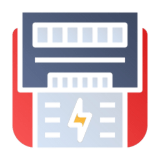How Hybrid Solar Systems Works
How does it actually works?
If you’re thinking about installing a hybrid solar system at your location, you’re likely asking the common question: How does it work? How does it capture solar energy and generate electricity efficiently?

SOLAR PANELS

INVERTER

Grid Connectivity

Battery

Energy Management



How Hybrid Solar Energy Systems Operate?
Hybrid solar systems, also known as photovoltaic or solar modules, utilize advanced technology to capture sunlight by absorbing photons. This process creates an electric field across the photovoltaic cell layers, generating electricity. The produced energy can power homes efficiently, offering a reliable alternative energy source.
The photovoltaic effect, where ‘photo’ means light and ‘voltaic’ refers to electricity production, drives this process. Hybrid solar systems significantly reduce electricity costs and promote environmental sustainability. The energy generated by these systems is waste-free, ensuring a clean and safe solution for powering homes.
1

Solar Energy Generation
The solar panels (also known as photovoltaic panels) absorb sunlight and convert it into direct current (DC) electricity through the photovoltaic effect.
2

Inversion of Power
The inverter in the system converts this DC electricity into alternating current (AC), which is used to power appliances in homes or businesses.
3

Battery Storage
Unlike traditional grid-tied systems, hybrid solar systems store excess energy in batteries. During peak sunlight hours, any surplus power that isn’t immediately needed is stored for later use, typically at night or during power outages.
4

Grid Support
If the stored battery energy is exhausted, hybrid systems can also draw power from the grid as a backup. Similarly, during times of high demand, the system can supply excess energy back to the grid, reducing electricity bills through net metering.
5

Continuous Power Supply
In the event of a power outage or during periods of low sunlight, the hybrid solar system will automatically switch to stored battery power, ensuring an uninterrupted energy supply.
FAQ
What is a hybrid solar system?
A hybrid solar system combines the features of both grid-tied and off-grid solar systems. It allows you to generate solar power, store excess energy in batteries, and use grid power when needed, offering flexibility and backup during power outages.
How does a hybrid solar system work?
Hybrid solar systems use solar panels to generate electricity, which is first used to power your home. Excess electricity is stored in batteries for later use. When the batteries are full, additional power can be exported to the grid or drawn from the grid when solar and battery power is insufficient.
What are the key components of a hybrid solar system?
A hybrid solar system consists of:
- Solar panels
- Hybrid inverter
- Battery storage
- Grid connection (optional for backup)
- Monitoring system (optional)
What are the benefits of a hybrid solar system?
Hybrid solar systems provide several advantages, including:
- Backup power during outages
- Maximized use of solar energy by storing excess in batteries
- Reduced reliance on the grid
- Potential savings on electricity bills
- Energy independence
Can I go completely off-grid with a hybrid solar system?
While hybrid systems offer battery backup, they are designed to work with both the grid and solar power. Going completely off-grid is possible with a hybrid system, but it would require larger battery capacity and a proper system design.
How long do the batteries in a hybrid solar system last?
The lifespan of hybrid solar batteries typically ranges from 5 to 15 years, depending on the battery type (such as lithium-ion or lead-acid) and usage patterns.
How much does a hybrid solar system cost?
The cost of a hybrid solar system varies depending on the size, components, and battery capacity. On average, hybrid systems can be more expensive than grid-tied systems due to the added cost of batteries, but they offer greater flexibility and backup power.
Can a hybrid solar system save money on electricity bills?
Yes, hybrid systems can reduce electricity bills by generating and using your own solar energy. Storing excess energy in batteries allows you to use solar power during peak hours or at night, further reducing grid consumption and costs.
